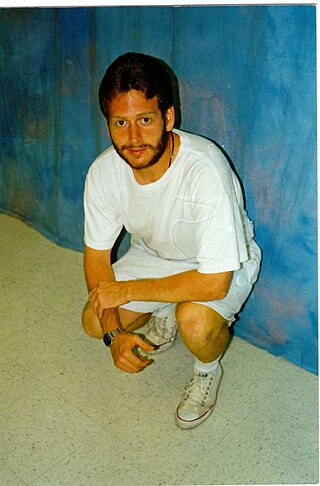
The United States Disciplinary Barracks (USDB), colloquially known as Leavenworth, is a military correctional facility located on Fort Leavenworth, a United States Army post in Kansas. It is one of two major prisons built on Fort Leavenworth property, the other is the military Midwest Joint Regional Correctional Facility, which opened on 5 October 2010. It reports to the United States Army Corrections Command and its commandant usually holds the rank of colonel.

California Men's Colony (CMC) is a male-only state prison located northwest of the city of San Luis Obispo, San Luis Obispo County, California, along the central California coast approximately halfway between Los Angeles and San Francisco.
Mandatory sentencing requires that offenders serve a predefined term of imprisonment for certain crimes, commonly serious or violent offenses. Judges are bound by law; these sentences are produced through the legislature, not the judicial system. They are instituted to expedite the sentencing process and limit the possibility of irregularity of outcomes due to judicial discretion. Mandatory sentences are typically given to people who are convicted of certain serious and/or violent crimes, and require a prison sentence. Mandatory sentencing laws vary across nations; they are more prevalent in common law jurisdictions because civil law jurisdictions usually prescribe minimum and maximum sentences for every type of crime in explicit laws.

Following the historic Lindbergh kidnapping, the United States Congress passed a federal kidnapping statute—known as the Federal Kidnapping Act, 18 U.S.C. § 1201(a)(1) —which was intended to let federal authorities step in and pursue kidnappers once they had crossed state lines with their victim. The act was first proposed in December 1931 by Missouri Senator Roscoe Conkling Patterson, who pointed to several recent kidnappings in the Missouri area in calling for a federal solution. Initial resistance to Patterson's proposal was based on concerns over funding and state's rights. Consideration of the law was revived following the kidnapping of Howard Woolverton in late January 1932. Woolverton's kidnapping featured prominently in several newspaper series researched and prepared in the weeks following his abduction, and were quite possibly inspired by it. Two such projects, by Bruce Catton of the Newspaper Enterprise Association and Fred Pasley of the Daily News of New York City, were ready for publication within a day or two of the Lindbergh kidnapping. Both series, which ran in papers across North America, described kidnapping as an existential threat to American life, a singular, growing crime wave in which no one was safe.

The United States Penitentiary, Coleman I and II are high-security United States federal prisons for male inmates in Florida. It is part of the Coleman Federal Correctional Complex and is operated by the Federal Bureau of Prisons, a division of the United States Department of Justice. USP Coleman I was opened in 2001, and in 2004 Clark Construction completed a 555,000-square-foot (51,600 m2) additional component for USP Coleman II.

Leroy David Baca is a former American law enforcement officer and convicted felon who served as the 30th Sheriff of Los Angeles County, California from 1998 to 2014. In 2017, he was convicted of felony obstruction of justice and lying to the FBI.

The United States Penitentiary, Allenwood is a maximum security United States federal prison in Pennsylvania. It is part of the Allenwood Federal Correctional Complex and is operated by the Federal Bureau of Prisons, a division of the United States Department of Justice.
In the United States, life imprisonment is the most severe punishment provided by law in states with no valid capital punishment statute, and second-most in those with a valid statute. According to a 2013 study, 1 of every 2 000 inhabitants of the U.S. were imprisoned for life as of 2012.

Richard J. Donovan Correctional Facility is a California state prison located in unincorporated southern San Diego County, California, near San Diego. It is a part of the California Department of Corrections and Rehabilitation. It is a 780-acre (320 ha) facility. It is the only state prison in San Diego County.

Walter Earl Ellis, known as The Milwaukee North Side Strangler, was an American serial killer who raped and strangled at least seven women in the city of Milwaukee, Wisconsin between 1986 and 2007. Until May 2009, the killings were considered to be independent of one another, but were then linked together via DNA profiling. Ellis was arrested as a suspect on September 7, 2009, and convicted for the seven murders in February 2011, receiving seven consecutive life sentences without the chance of parole.
The Continuing Criminal Enterprise Statute is a United States federal law that targets large-scale drug traffickers who are responsible for long-term and elaborate drug conspiracies. Unlike the RICO Act, which covers a wide range of organized crime enterprises, the CCE statute covers only major narcotics organizations. CCE is codified as Chapter 13 of Title 21 of the United States Code, 21 U.S.C. § 848. The statute makes it a federal crime to commit or conspire to commit a continuing series of felony violations of the Comprehensive Drug Abuse Prevention and Control Act of 1970 when such acts are taken in concert with five or more other persons. For conviction under the statute, the offender must have been an organizer, manager, or supervisor of the continuing operation and have obtained substantial income or resources from the drug violations.

The United States Penitentiary, Victorville is a high-security United States federal prison for male inmates in California. It is part of the Federal Correctional Complex, Victorville and is operated by the Federal Bureau of Prisons, a division of the United States Department of Justice.

Timothy Leonard Tyler is an American who was sentenced to life in prison for possession and distribution of LSD under the federal three-strikes law. In August 2016, after serving 24 years and 27 days behind bars, Tyler was granted clemency by President Barack Obama. He was released on August 30, 2018.

Criminal justice reform seeks to address structural issues in criminal justice systems such as racial profiling, police brutality, overcriminalization, mass incarceration, and recidivism. Reforms can take place at any point where the criminal justice system intervenes in citizens’ lives, including lawmaking, policing, sentencing and incarceration. Criminal justice reform can also address the collateral consequences of conviction, including disenfranchisement or lack of access to housing or employment, that may restrict the rights of individuals with criminal records.
The Townville Elementary School shooting occurred on September 28, 2016, in Townville, South Carolina, located 40 miles (64 km) southwest of Greenville. Fourteen-year-old Jesse Osborne shot three students and a teacher, critically wounding six-year-old student Jacob Hall, who died from his injuries three days later. Osborne, who had also shot and killed his father before the shooting, was arrested as the sole suspect and charged with murder and attempted murder.

Richard Wershe Jr., known as "White Boy Rick", is an American former drug trafficker and Federal Bureau of Investigation (FBI) informant. The youngest known informant in the history of the FBI, Wershe became a confidential informant when he was 14 to 16 years old. When he was 15, Wershe told the FBI that a major drug dealer had spoken of paying a bribe to Detroit detective inspector and subsequent city council president and mayoral candidate Gil Hill in order to quash the investigation into a 13-year-old boy's murder. At the age of 17, Wershe was arrested for possession of 8 kg of cocaine and he was sentenced to life imprisonment. In 2017, justice campaigners publicized Wershe's case and he was subsequently paroled, but directly to a prison in Florida to serve another five years for an auto theft conviction from 2008. Campaigners for Wershe have suggested to reporters that the length of his incarceration may have been connected to him having provided the FBI with information leading to the arrest of family members and associates of former Detroit mayor Coleman A. Young, as well as the allegation about Young's political ally Hill. In 2016, a notorious former Detroit hitman alleged Hill had once tried to commission the murder of Wershe.

Alice Marie Johnson is an American criminal justice reform advocate and former federal prisoner. She was convicted in 1996 for her involvement in a Memphis cocaine trafficking organization and sentenced to life imprisonment. In June 2018, after serving 21 years in prison, she was released from the Federal Correctional Institution, Aliceville, after President Donald Trump granted her clemency, thereby commuting her sentence, effective immediately.
Brittany K. Barnett is an American attorney and criminal justice reform advocate. Through the organization Buried Alive, which she co-founded with Sharanda Jones and Corey Jacobs, she came to national attention when she and her co-counsel, MiAngel Cody, litigated the release of 17 people in 90 days. Her organization has received funding and endorsement from television personality Kim Kardashian. Barnett is also the founder of Girls Embracing Mothers, a non-profit organization that provides support for girls with mothers in prison.

Bobby Bostic is an American writer who was sentenced to a term of 241 years. On December 12, 1995, Bostic, aged 16, along with 18-year-old Donald Hutson robbed a group of people in Missouri at gunpoint, and shortly thereafter robbed and briefly detained a woman in her car. The pair were caught later that day. Hutson was offered a plea deal and accepted 30 years in prison. On the advice of family, Bostic declined the same offer and elected to go to trial. He was given a sentence of 241 years by Judge Evelyn Baker, making him eligible for parole when he was 112. Bostic was serving the longest sentence in Missouri given to a juvenile for non-homicide offenses.
The CAN-DO Foundation is a 501(c)3 nonprofit foundation that fights for the release of nonviolent drug offenders from prison. The foundation educates the public about conspiracy law and advocates for law reform.













